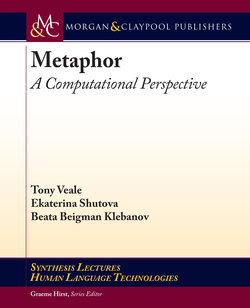Читать книгу Metaphor - Tony Veale - Страница 8
На сайте Литреса книга снята с продажи.
ОглавлениеPreface
The aim of this book is to introduce metaphor research to the wider NLP community, and to survey the state-of-the-art in computational methods in a way that may also be helpful to those approaching metaphor from a perspective that is not principally informed by work in Artificial Intelligence (AI). We focus on the history, methods, and goals of past research into this fascinating phenomenon in the hope of making metaphor a more accessible topic of future research, thereby pushing it further up the NLP community’s wait-list. Our treatment will provide a condensed history of metaphor research that introduces the main theories of metaphor that survive, in one form or another, in contemporary analysis. Our coverage will include the main AI contributions to the field, which are modern attempts to give algorithmic form to views on metaphor that range from the ancient to the contemporary. And, just as contemporary AI research has taken on a distinctly web-colored hue, we shall explore the role of the Web in metaphor research, both as a source of data and as a computational platform for our metaphor-capable NLP systems. Computational linguistics and AI alike have each embraced statistical models as a means of improving robustness, exploiting rich veins of user data, and reducing a system’s dependence on hand-crafted knowledge and rules. Metaphor research offers no exception to this trend, and so our book will also explore the role of statistical approaches in the analysis of metaphorical language. Since such approaches are ultimately only as good as the data over which they operate, we shall also focus on the contributions of corpus linguistics to the construction of annotated metaphor corpora. Finally, we shall draw these strands together to offer an application-oriented view of metaphor, asking whether there is a killer application for metaphor research, and whether (and how) computational approaches to metaphor can help advance not only the field of NLP, but other fields as well, such as the social sciences and education.
The ultimate goal of this book is not to make you believe, as we do, that metaphor is the very soul of language, though the growing field of metaphor research is always eager to welcome new converts. We will consider this book a success if readers take away a desire to address metaphor head on, in some form or another in their research, and find in this book the necessary tools to make this engagement a practical reality.
Tony Veale, Ekaterina Shutova, and Beata Beigman Klebanov
January 2016
